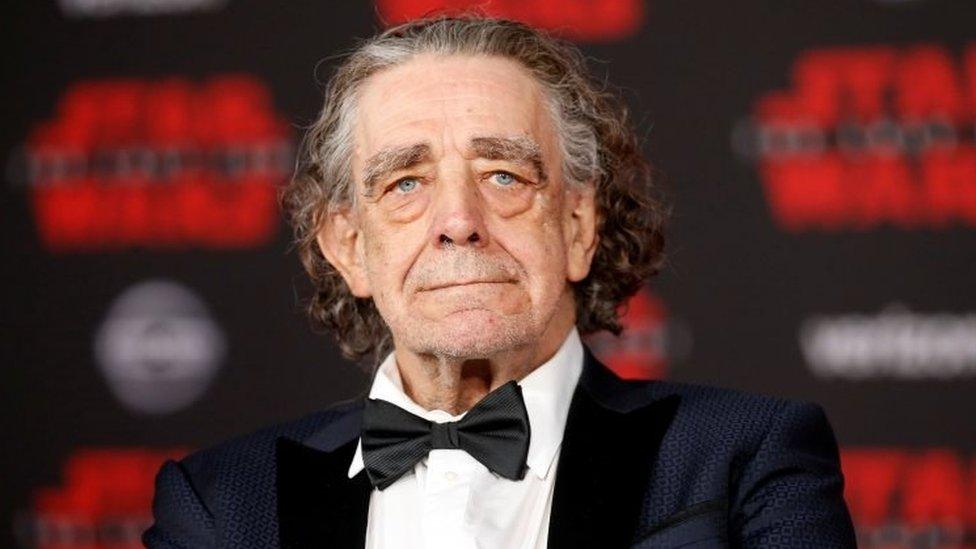How Peter Mayhew became Chewbacca
- Published
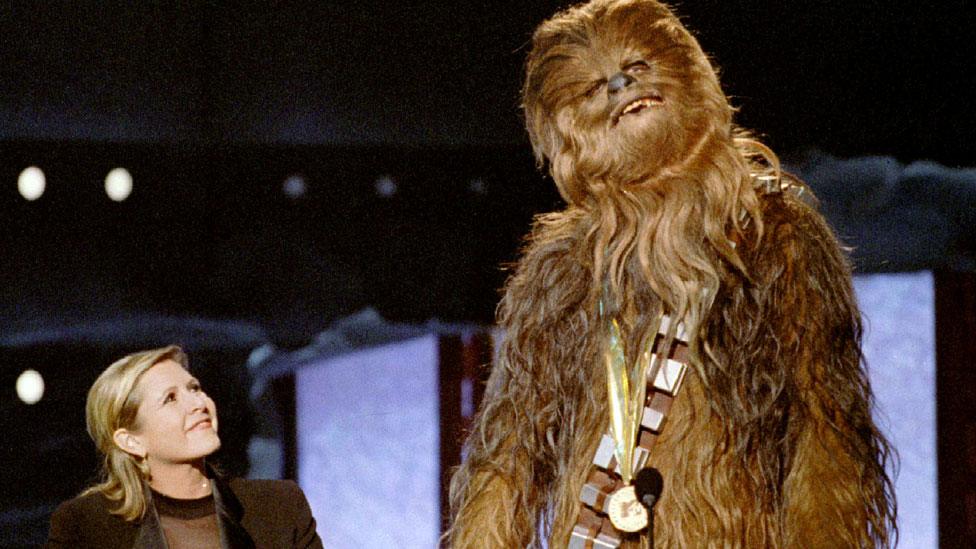
The princess and Chewie: Carrie Fisher and Peter Mayhew
Peter Mayhew played Chewbacca, the gentle giant with a distinctive growl, in Star Wars films for almost 40 years - but how did he find himself inside that huge, hairy costume?
The London-born son of a policeman was diagnosed with gigantism, a condition that causes excessive growth, aged eight. Mayhew also had a related genetic tissue disorder called Marfan Syndrome, external.
He went on to reach a towering 7ft 2in (2.18m) and started his working life in engineering.
But, according to his charity foundation, external, he felt "more fulfilled" working as an orderly at King's College Hospital in the capital.
He was spotted for his film career by chance, when a local reporter published a photograph of him.
It was seen by the producers of Ray Harryhausen's action fantasy Sinbad and the Eye of the Tiger.
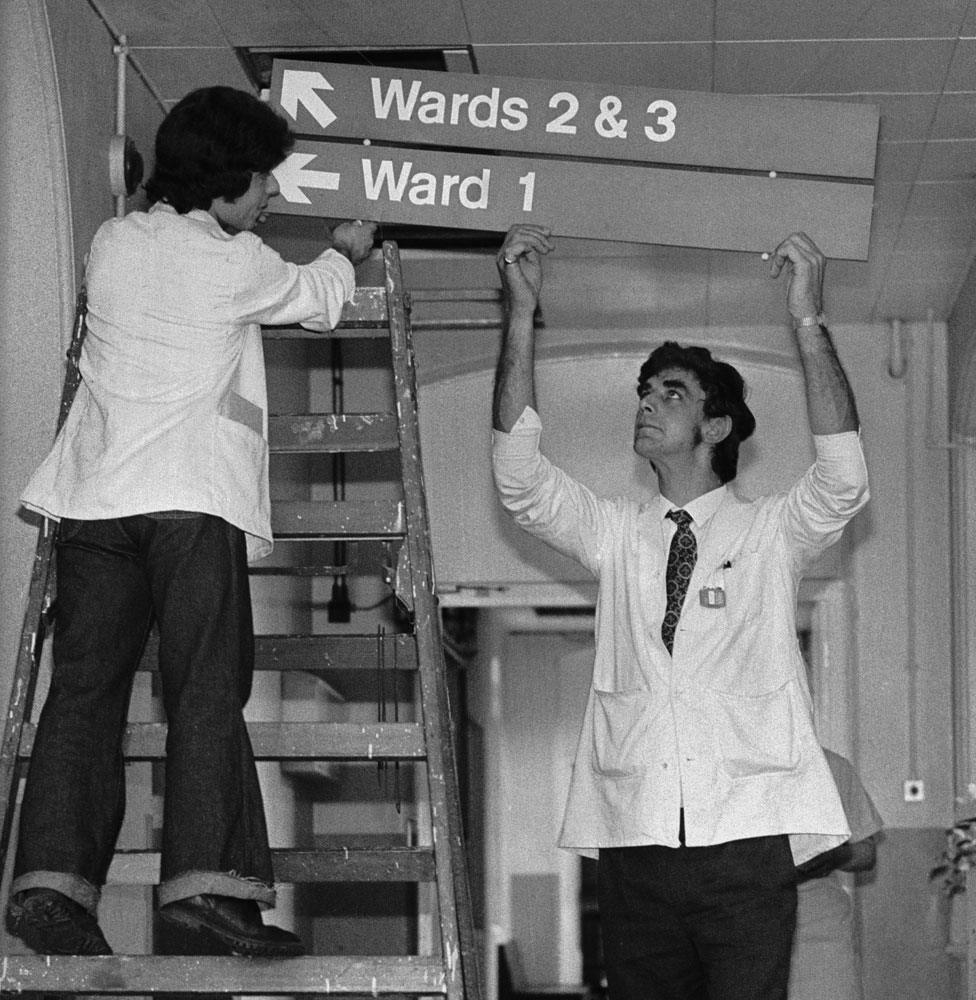
Mayhew's hospital work in 1977 included helping put up signs

This led to Mayhew playing the Minoton, a huge half-man half-bull bronze creature in the 1977 Sinbad film.
He had exactly what Star Wars creator George Lucas needed when he was casting Chewbacca - height. Lucas had initially asked Dave Prowse, but he bagged Darth Vader instead.
Mayhew was perfect for the role of Chewie, the loveable, even cuddly sidekick to Harrison Ford's intergalactic smuggler Han Solo.
Han, the pilot of the Millennium Falcon, saved the Wookiee from imprisonment, sparking their life-long friendship.
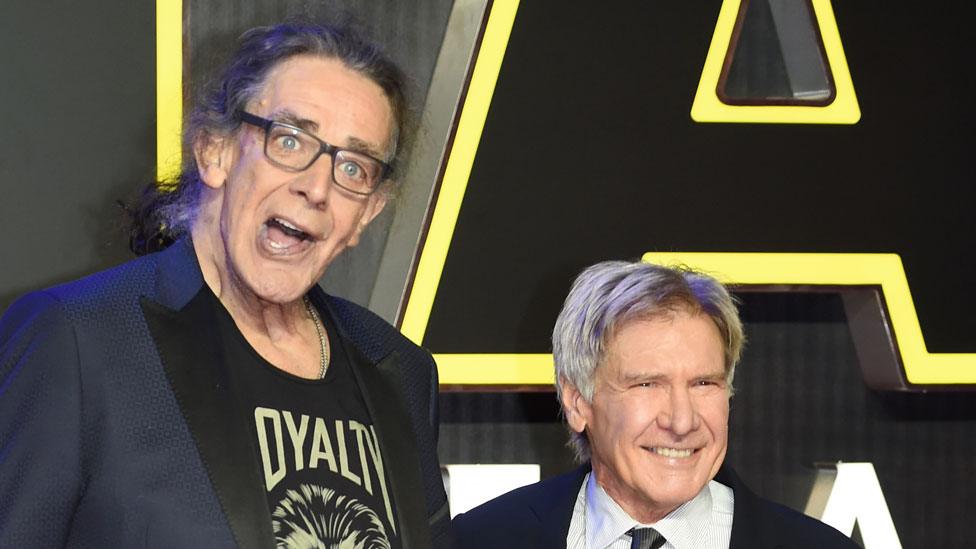
Friends on and off-screen: Peter Mayhew and Harrison Ford
Once he was cast, Mayhew set about researching his character by studying bears, monkeys and gorillas in his local zoo - preparing to bring his character to life once he was encased in the yak hair costume.
In a 2015 interview with Rolling Stone, external, the actor summed up Chewbacca's role by saying: "My character is a teddy bear, basically.
"I bet you, if you looked around your office, how many people had a teddy bear as a youngster or a security blanket as a youngster? And that's what Chewie is, he looks after everybody."
The only bit of Mayhew that could be seen was his eyes, which, along with his body language, were his only means of expression.
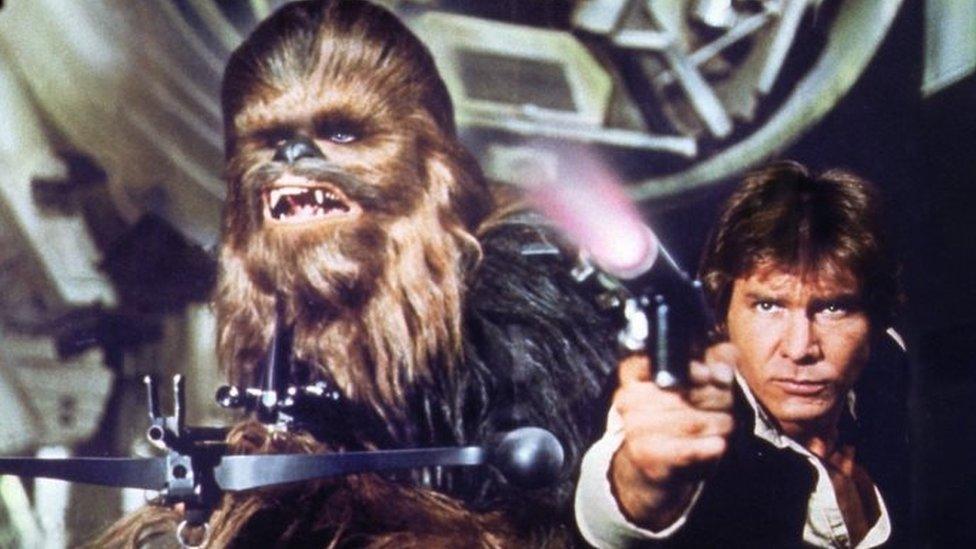
Peter Mayhew played Chewbacca (L) alongside Harrison Ford in Star Wars Episode IV
He was told by Lucas the Wookiee was "a mime character because they put the noises on afterwards", which turned out to be a relief.
"It makes it easier for me, because just try making loud enough noises through a mask!" Mayhew said.
"It's very hard so you do as well as you can, and then they take it to the sound studio and put their own voices in it. It's not easy, really."
Allow YouTube content?
This article contains content provided by Google YouTube. We ask for your permission before anything is loaded, as they may be using cookies and other technologies. You may want to read Google’s cookie policy, external and privacy policy, external before accepting. To view this content choose ‘accept and continue’.
Chewbacca's distinctive growl was actually made by sound designer Ben Burtt, who created the sound by collecting noises made by bears, walruses, lions, badgers and sick animals.
Burtt said he "extracted little grunts and put them all on one tape" and then collected sounds covering a range of emotions, such as affection and anger.
Mayhew played the 200-year-old Wookiee for the first trilogy of Star Wars films.
His other showbiz appearances included the Donny and Marie show in 1977, 1978's Star Wars Holiday Special and The Muppet Show in 1980, plus several commercials.
Once the fuss about Star Wars had died down, he moved to Yorkshire, where he "lived quietly".
But the Force came calling again in 1997 after a special edition of the films was released. With fans' interest reignited, Mayhew travelled the world, meeting them on the convention circuit.
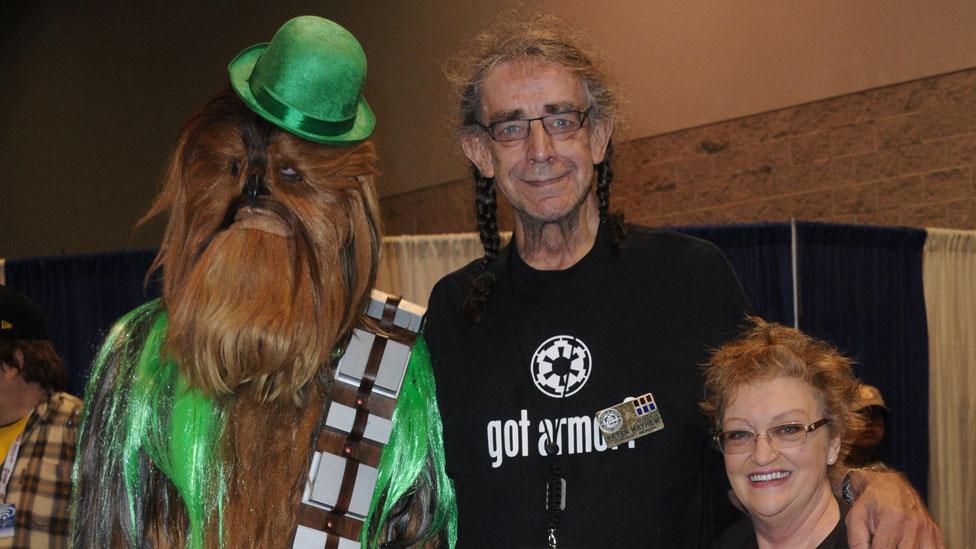
Mayhew and his wife Angie met a familiar face at a 2012 fan convention
After marrying his wife Angie in 1999, he moved to Texas, becoming a US citizen six years later. He also reprised his role as Chewie for 2005's Episode III: Revenge of the Sith.
He shot a few scenes in Australia with Lucas himself, who, according to Mayhew, "set aside time personally" to direct him.
In 2009, he received the MTV Movie Awards lifetime achievement prize from Carrie Fisher, who played Princess Leia.
His final Star Wars film was 2015's The Force Awakens, directed by JJ Abrams.
Abrams called Mayhew, asking him if he could appear in the film.
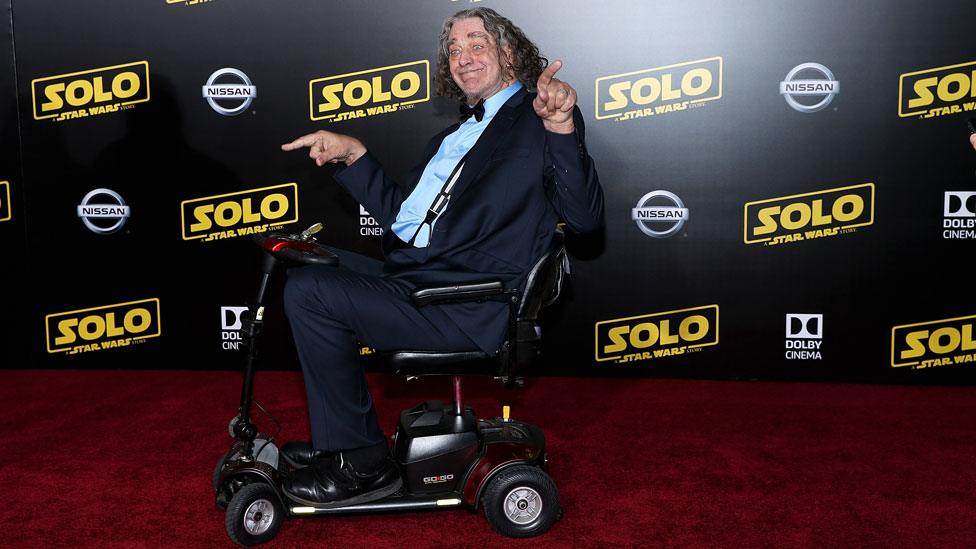
Mayhew [pictured in 2018] had difficulty with mobility in his later life
Mayhew recalled the conversation with Rolling Stone, saying: "I explained that I had just had a medical procedure before we even started - I laid my cards on the counter.
"I said, 'Look, I can't walk. I can do most things, but the only thing I can't really do is walk. But I can do the facial expressions and everything else like that for Chewie.'
"And he said, 'Right, we'll find out what you have to do and we'll get it done.' So I was very, very pleased."
He shared the role of Chewbacca with Joonas Suotamo, who was his double in The Force Awakens and went on to play the Wookiee in The Last Jedi in 2017 and last year's Solo: A Star Wars Story.
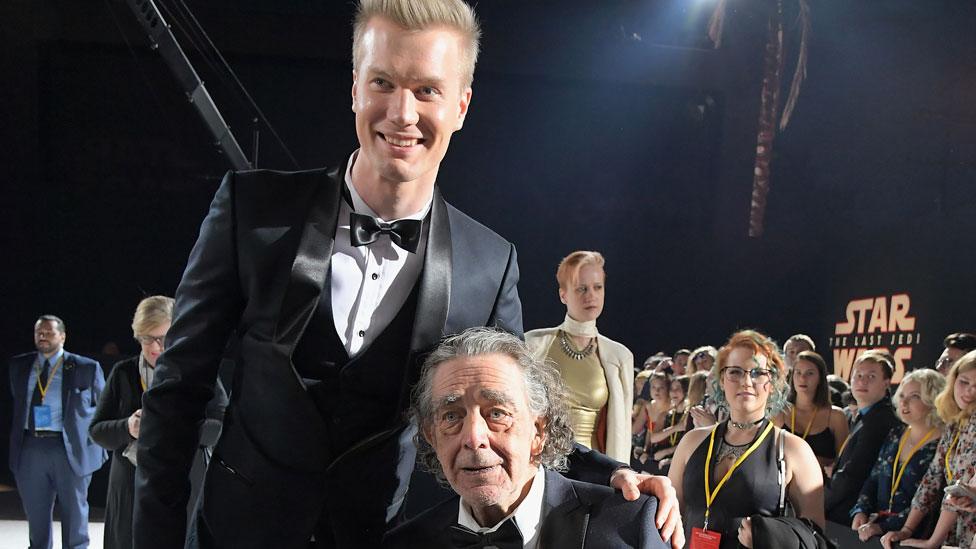
Joonas Suotamo went on to play Chewbacca

Mayhew, who used a walking cane shaped like a light saber, external, had spinal surgery in 2018 to help with mobility.
In 2012, he set up a charity, The Peter Mayhew Foundation, "devoted to the alleviation of disease, pain, suffering and the financial toll brought on by life's traumatic events".
He also wrote two books, Growing Up Giant and My Favorite Giant.
Allow X content?
This article contains content provided by X. We ask for your permission before anything is loaded, as they may be using cookies and other technologies. You may want to read X’s cookie policy, external and privacy policy, external before accepting. To view this content choose ‘accept and continue’.

Film journalist Jamie East said Mayhew was an "ambassador for the whole Star Wars trilogy".
As well as appearing at conventions, he "would pop up quite often on Reddit during fans' discussions on Star Wars, and say hello". The fans' delight at meeting him was a big part of his life, East said.
"He knew what he was there for, and revelled in the fact he could spread so much happiness with fans."

Follow us on Facebook, external, on Twitter @BBCNewsEnts, external, or on Instagram at bbcnewsents, external. If you have a story suggestion email entertainment.news@bbc.co.uk, external.
- Published3 May 2019

- Published3 May 2019
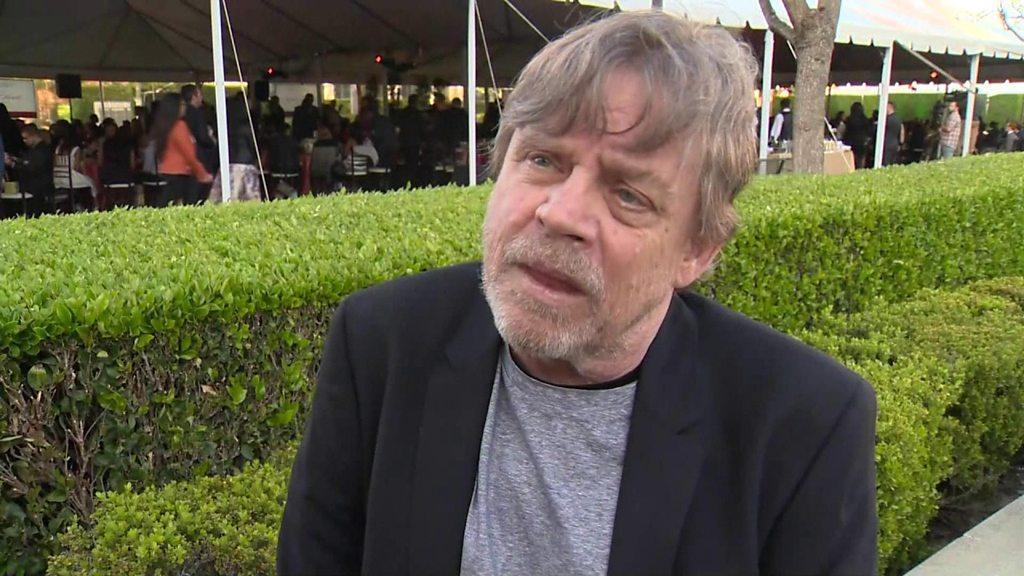
- Published3 May 2019
